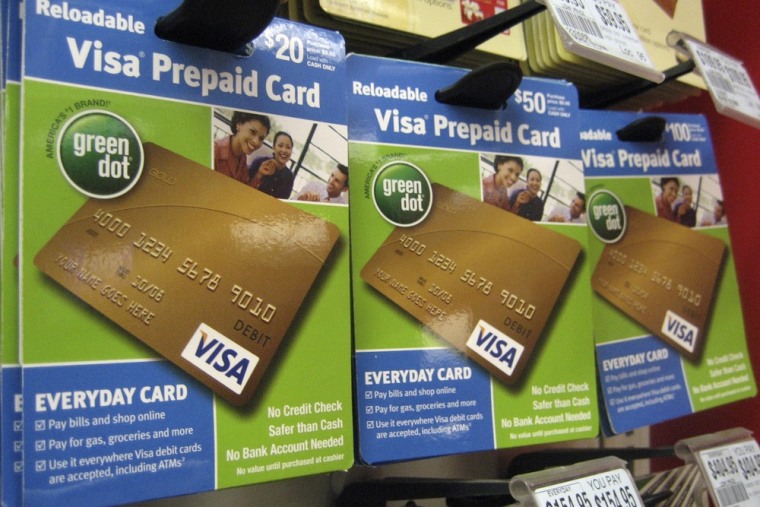There’s a big change taking place. Many young people and those who want to avoid, or don’t qualify for, traditional financial products are choosing to use prepaid debit cards.
A new study from Javelin Strategy and Research finds that the use of prepaid cards rose by about 18 percent last year. About 13 percent of the households in this country had one of these cards in 2011.
Debit cards linked to checking accounts are still significantly more popular than prepaid cards. But the Javelin report points out that prepaid cards are “one of the few major financial products that has grown in usage in the past year.” In fact, the number of Americans with credit cards, checking accounts, and bank debit cards is actually falling.
Beth Robertson, director of payments research at Javelin, says these cards are no longer just for people who don’t have a lot of money.
“Today’s prepaid features match and even surpass the features of many checking accounts, Robertson says. “ They include allowing you to manage your card through your mobile device or social media account, or make person-to-person transfers.
The use of these cards is soaring. According to the Mercator Advisory Group $28.6 billion was placed onto reloadable prepaid cards in 2009. By next year that figure could reach $200 billion.
Why are these cards so popular?
To find out, the Pew Health Group’s Financial Security Portfolio conducted focus groups with people who buy prepaid debit cards. Users said they like the cards because they help them budget and control their spending. They put a certain amount of money on the card and when it’s empty, they’re done.
(Read: Key Focus Group Findings on Prepaid Debit Cards)
Most of those in the focus groups also had checking accounts. But they use prepaid cards to avoid overdraft fees.
“They’d rather pay the $3 and $4 fees to load and reload rather than pay a $35 overdraft fee,” says Pew’s Susan Weinstock. “And just the fear of the overdraft fee seems to be driving them toward using a prepaid card."
Focus group participants said things like:
“I don’t like the fees on prepaid debit cards…but I’d prefer to pay the $3.95 than have to deal with the things that I know that people go through with their checking accounts.
“I think (prepaid card fees) are fair because they’re upfront. This is the cost of the card; this is the cost for the services. It’s up to you at that point.”
The Pew researchers were surprised to find that prepaid cards also appeal to people who don’t want their purchases tracked. These consumers buy the cards but don’t register them. When the money’s gone, they buy another.
“They like the anonymity of the card,” Weinstock says.
Watch out: tons of fees
There’s no question a prepaid card can be a useful money management tool for some people. But most cards have all sorts of fees.
“There are more fees than you will typically find on either a credit or debit card,” says Ruth Susswein, deputy director of national priorities at Consumer Action, an advocacy group based in San Francisco.
Consumer Action just released a survey of the prepaid card market. They examined 28 cards from 11 issuers. Most are available nationwide.
The survey compared the costs to buy, load and use the cards. It found fees vary greatly from card to card.
“Some of these fees can really be unconscionable,” Susswein says.
There were fees for reloading money, ATM cash withdrawals, balance inquiries, or making a purchase without enough money on the card. There may even be a fee if you close the account or don’t use the card for a few months.
Most of the cards (20 out of 28) have monthly maintenance fees. The READYdebit Visa Prepaid Platinum had the highest fee in this survey – $14.95 a month.
Consumer Action found that some cards make it possible to avoid the monthly charge:
- Mango, Bank Freedom, Capital One and Regions Bank waive monthly fees when you load $500 or more per month.
- Green Dot cards waive the $5.95 fee if you make at least 30 purchases or load at least $1,000 onto your account each month.
The bottom line: “Some prepaid cards should be avoided because of the ‘gotcha’ fees,” Susswein advises. “Other cards really can be quite a good deal and quite a convenience tool for people if they know how to avoid many of the fees.”
For example, if there’s a charge to withdraw cash from an ATM, get extra cash back at the register when you make a purchase. If there’s a fee to check the balance over the phone, see if the card company offers free balance updates online or via text message.
Warning: consumer protection lacking
Prepaid cards are every bit as convenient to use as a checking account debit card. But federal law does not require them to provide the same protections for fraud and error resolution. Most prepaid cards do offer those protections voluntarily. But because it’s voluntary, it can change at any time for any reason.
Something else to remember: unlike checking accounts, prepaid cards may not have FDIC protection. If the company goes bust, you could be out the money loaded onto the card.
Finally, prepaid card companies do not have the same obligation that banks have to disclose fees. So you’d better take the time to find out before you buy that card.
